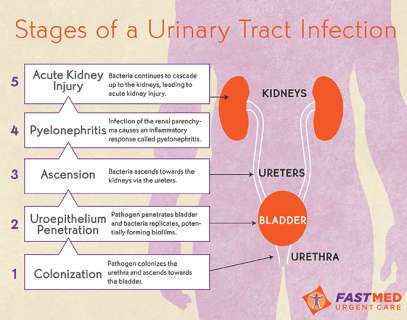Were you ever told to pee immediately after sex? There’s a reason for that and it’s to avoid Urinary Tract Infections.
Often referred to as the Honeymooner’s Disease, urinary tract infections (UTIs) are a plague for the sexually active, especially those who are uninformed about proper sexual hygiene.
What is a Urinary Tract Infection (UTI)?
It isn’t just one part of your body that gets infected when you have a UTI. It can be any of the tubes or organs in your urinary tract, and someone it’s more than one. From your urethra, your bladder, to even your kidneys, UTIs are serious business– especially if they involve your kidneys. If your kidneys are infected and untreated, it can do permanent damage to your ability to process waste, which could end in very serious consequences. This makes it incredibly important to see a doctor if you even so much as think you have a UTI.
People with vaginas are more often infected with UTIs because they have shorter urethras and it’s much easier for bacteria to get inside them during sex then people with penises. But this doesn’t mean they are impervious.
Types of UTIs
- Urethritis: an infection of the urethra. Urethritis manifests as painful or burning urination, but that is usually the only symptom.
- Acute pyelonephritis: an infection in the kidney. A lot of times, these are caused by kidney stones, but they can also be caused by an infection elsewhere on the urinary tract that has gone internal. This is the more serious form of a UTI and should be treated immediately.
- Cystitis: a bladder infection. Cystitis also involves painful urination, but can have other symptoms as well, including pressure on your bladder or blood in the urine. This one is also very serious and should be treated immediately.
Not a UTI but similar:
- Cervicitis: an infection of the cervix.
- Bacterial vaginosis: a vaginal infection.
Symptoms
There are a wide variety of symptoms that can manifest during a UTI. The following are some of the most common:
- Cloudy, red, or pink urine.
- Frequent pressure on your bladder as though you have to pee, but you can’t.
- Pain in your lower belly/or pain in your back underneath your ribs.
- Pain or burning when you pee.
Now, these symptoms can imply something entirely different as well– kidney stones, prostate disease, or some other kind of infection (including certain STDs). A UTI can even go hand-in-hand with some of these diseases, such as having a kidney stone scratch up your kidneys and urethra which leads to infection. The best way to know is to go to your local clinic or your doctor and have a pee test done. Your doctor will be able to deduce if you have an infection based on the bacteria and white blood cell count in your urine.
What To Do
Having UTIs frequently may be caused by a larger problem. It could be diabetes, a pregnancy, prostate problems, or it could be that you’re just prone to them. Some people are– and that means they have to be extra vigilant protecting themselves.

If you have these symptoms and find that they’re accompanied by nausea/vomiting, fever, or if you’re over 65, pregnant, or have a chronic illness, your UTI may be more serious. Contact your doctor.
UTI Prevention
Peeing after sex flushes out your urethra (that’s your pee tube) of any germs you might have picked up while interacting with your partner’s body. Make peeing after sex a habit, even if you are using protection. That way, if there ever comes a day when you decide to abandon your Caution Wear Classic to go au naturel, you’ll be prepared to take your health into consideration.
It’s even recommended to pee before sex– to get any excess bacteria out before it affects your partner. So whenever you’re thinking about sex, just go ahead and pee away!
Another great way to keep your respective genitals free from bacteria? Wearing protection, like a condom. In fact, it’s even been found that condoms can give vaginas a boost of positive bacteria, which is a great way to prevent harmful infections, like UTIs.
Even consider wearing a condom during anal. That’s right– just because you can’t get pregnant doesn’t mean a condom won’t help. The anus is full of all kinds of bacteria ripe and ready to make your world hell if it gets into the wrong place. Getting some in a penis’ urethra, or having it come into the vagina somehow can be very dangerous and uncomfortable.
If you already have a UTI, this seems like it would be common sense because of the intense and excruciating pain, but stop having sex. Stop. Seriously. Not only will it probably hurt like a mofo, but you run the risk of spreading it to your partner, who, in turn, can spread it back to you on a later date. So stop it.
Also, you may want to be careful with your lube choice. Oil-based lubes, like coconut oil, feel great and can have some pretty amazing benefits, but they can also trap bacteria where it shouldn’t be. If you use an oil-based lube, take extra care. Other lubes, like those with glycerin or parabens, can sometimes exacerbate an infection, especially if you have sensitive skin.
Folks with vaginas can also take special precautions by making sure they leave their vaginas the hell alone. Don’t use douches or soaps to clean out your lady bits– you’ll wash away beneficial bacteria used to fight those infections. Warm water on the outside of your labia is enough to keep you fresh and clean. Read more about vagina care in our Ten Vagina Dos and Don’ts.
[Source: WebMd]